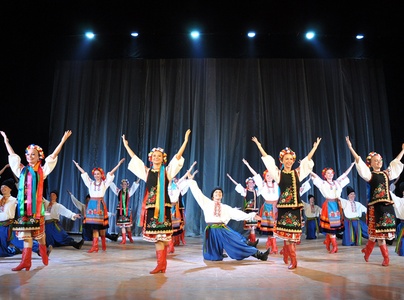Igor Moiseyev State Academic Ensemble of Popular Dance
Igor Moiseyev State Academic Ensemble of Popular Dance is the world’s first and only professional dance company focusing on interpreting and promoting ‘dance folklore’ of the world’s nations.
The ensemble, established in 1937, gave its first performance on August 29, 1937 at the Moscow Hermitage Theater. The founder of the company Igor Moiseev (1906–2007) put an emphasis on interpreting traditional dances that could still be found in the USSR back then. To discover them, the company members went on folk expeditions around the country searching for vanishing dances, songs, and rituals. Their findings were the basis of the ensemble’s first programmes, Dances of the USSR Nations (1937–1938) and Dances of the Baltic Nations (1939) were composed. In 1943, the company established a dance school.
The company repertoire kept evolving to also include artistic interpretations of European folk dances. The programme Dances of Slavic Nations (1945) was made up in the time when travelling abroad was impossible, therefore, while reconstructing traditional dances, Igor Moiseev had to consult musicians, folklorists, historians, and music experts. As a result, the accuracy of ethnic choreography in those new productions was highly appreciated by the audiences in Poland, Hungary, Romania, Czechoslovakia, Bulgaria and Yugoslavia, where the company toured in 1946.
Since then, the ensemble has been widely acknowledged as both a school and a creative laboratory for choreographers from all over the world, and its repertoire has become a kind of encyclopedia of the world’s dance practices. It inspired many folk dance companies that were later set up in every Soviet republic (now the CIS states) and in many European countries.
The ensemble’s landmark Peace and Friendship programme was created in 1953 with the contribution of prominent folklore experts, such as choreographers Miklos Rabai (Hungary), Lyubushe Ginkova (Czechoslovakia), Ahn Son Hee (Korea). It was the first programme featuring folk dances from 11 countries of Europe and Asia. In 1955, the company was the first Soviet ensemble to tour abroad during the Iron Curtain period, performing in Paris and London. A USA tour followed in 1958.
The company’s most striking programs include The Road to Dance (Class Concert, 1965), which clearly displays the group’s progress from mastering individual pieces to creating full-scale stage productions. For this programme, the company was awarded the title of Academic Ensemble, and Igor Moiseyev received his Lenin Prize. In 1987, the company was awarded the Order of Friendship of Peoples.
Other signature programs of the company include Partisans, naval suite Yablochko, the old urban Quadrille, the Moldavian Jock, the Ukrainian Hopak, the Russian Summer dance, the Italian Tarantella; one-act performances Vesnyanka, Tsam, Sanchakou, Polovtsian Dances (music by Borodin), At the Skating Rink (music by J. Strauss), Night on Bald Mountain (music by Musorgsky), Spanish Ballad (music by Pablo di Luna, Evening in the Tavern (music by Argentine composers) and others.
Since 2011, the ensemble has been headed by Elena Shcherbakova, a graduate of the Bolshoy Theater choreographic school and the Russian Academy of Theater Arts. A student of Igor Moiseyev, she used to be the company’s soloist bedore starting to teach at the Ensemble Studio School. Elena Shcherbakova is People's Artist of Russia and has also been awarded the Order of Friendship, Order of Honor, and Order of Merit to the Fatherland, IV class as well as the Russian Government Prize and the Soul of Dance prize.



